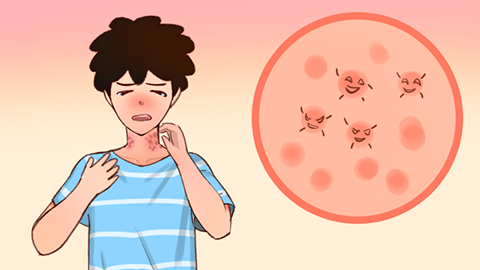How to treat eczema on the face
Generally, eczema on the face may be caused by contact with irritants, imbalances in mental and immune regulation, seborrheic dermatitis, atopic dermatitis, or contact dermatitis. It can be treated under a doctor's guidance with general treatments or medication. If discomfort occurs, prompt medical attention is recommended. Detailed explanations are as follows:

1. Dry Skin
The skin's barrier function depends on adequate moisture and oils. When the environment is dry, or facial washing is frequent or overly aggressive, the skin's protective lipid layer can be damaged, increasing moisture loss and weakening the skin's barrier function, thus triggering facial eczema. Avoid washing your face with excessively hot water, and choose gentle, moisturizing facial cleansers.
2. Mental and Immune Dysregulation
Long-term stress, anxiety, or insufficient sleep can affect skin immune function via neuro-immunological pathways, leading to the release of inflammatory factors that trigger or worsen eczema. It is recommended to adjust daily routines, ensure sufficient sleep, and relieve stress through meditation, exercise, and other methods.
3. Seborrheic Dermatitis
Seborrheic dermatitis is often caused by overactive sebaceous glands and Malassezia infection. Excessive sebum production provides a favorable environment for Malassezia growth. Substances produced during Malassezia proliferation can irritate the skin, causing inflammatory reactions and resulting in eczematous changes on the face, possibly accompanied by oily skin and flaking. Patients can use medications such as tacrolimus ointment, selenium sulfide shampoo, and vitamin B6 tablets under a doctor's guidance.
4. Atopic Dermatitis
Atopic dermatitis may be related to genetic factors. Genetic defects in skin barrier function make patients more susceptible to external allergens and irritants, triggering immune responses and eczematous changes on the face. Symptoms may also include dry, intensely itchy skin. Patients should use medications such as hydrocortisone butyrate cream, loratadine syrup, and recombinant human epidermal growth factor gel according to medical instructions.
5. Contact Dermatitis
Contact dermatitis may result from exposure to exogenous substances. These substances act as allergens or irritants, inducing immune or inflammatory responses in the skin, causing eczematous symptoms on the face, possibly accompanied by redness, blisters, itching, and other symptoms. Patients can use medications such as calamine lotion, mometasone furoate cream, and cetirizine drops under a doctor's advice.
In daily life, it is important to protect against sun exposure and avoid damage from ultraviolet radiation. Maintain a clean and well-ventilated living environment to reduce the proliferation of allergens such as dust mites. Avoid frequently changing cosmetics, allowing the skin adequate time to adjust.







